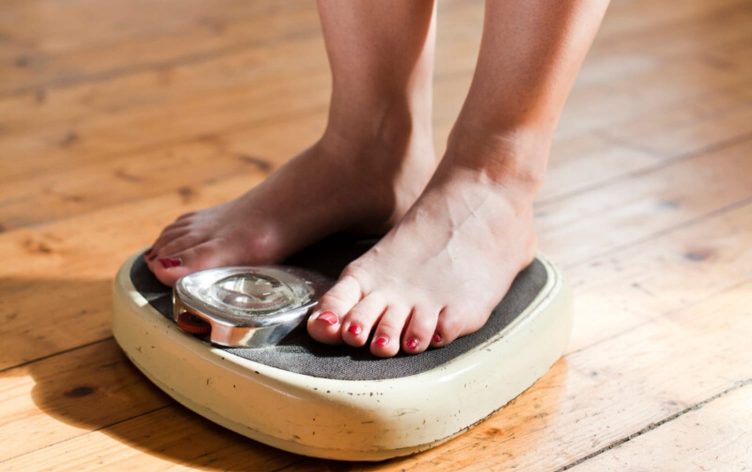Why Your Weight Fluctuates

Let’s discuss a number of reasons that lead to the benign, yet frustrating, experience and what you can do about it.
1. PHYSICAL WEIGHT OF FOOD AND DRINKS
Food and drink supply the body nutrients and calories that influence weight gain, loss or maintenance. Food and drink also have actual mass completely unrelated to calorie count which influences body weight in the short term. If you drink two cups of water (a substance with zero calories) and immediately step on the scale, you will be a pound heavier due to that liquid mass — but it does not mean you have actually gained a pound of fat, muscle or other body tissue. For this reason, it is best to weigh yourself first thing in the morning before consuming anything. However, if you ate a big meal late the night before, the chances are, it isn’t fully digested and will lead to a higher number on the scale.
2. CARBS AND SODIUM
Another thing that can cause pseudo-weight increase is your fluid balance. Sweat and dehydration can create losses, but water retention from carbohydrates and sodium causes temporary weight gain.
Athletic situations, such as pre-workout or carb-loading, require high carbohydrate intake to load muscles and liver with glycogen to burn while training or in competition. While great for energy availability, each gram of carbohydrates stored requires 2–3 grams of water to go with it. This water will be lost as the carbohydrates are burned off, which is why the gain is only temporary.
Sodium is a mineral responsible for fluid balance and binging on a super salty meal can cause an imbalance in fluid levels between your gut and vasculature, leaving you with a bloated, puffy feeling as the body struggles to regulate fluids. Managing sodium needs can be tricky for athletes, as they vary greatly from person to person based on sodium sweat concentration. Those who sweat heavily and often have crusty, white residue on their skin and clothes after a workout, have daily needs far beyond the suggested intake of 2,300mg/d for the general public.
3. SWEAT
Water lossis a big factor in quick weight fluctuations. Many athletes succumb to dehydration during long, hard workouts, especially in hot and humid conditions. Dehydration of 2% body weight that isn’t replenished before weighing in results in a 3-pound ‘loss’ for a 160-pound adult. Weighing yourself before and after workouts can provide you with a sweat rate and allow you to replenish fluids lost more accurately.
4. DAY OF THE WEEK
Our eating habits change throughout the week. Typically, the week starts off with healthy motivation on Monday and slowly declines as the week goes on to happy hour and take-out over the weekend. Studies have shown this eating cycle is reflected on the scale with the highest weigh-ins being Saturday through Tuesday before decreasing again as your body processes and adjusts for the varying intake. This cycle should be accredited to normal fluctuations and not attributed to true weight gain. If you’d like to reduce this weekly flux, aim to maintain consistent, healthy eating habits all seven days of the week.
5. HORMONES
Cortisol, the stress hormone can be elevated after workouts and other periods of high physical or mental stress. This hormone increases inflammation in the body which messes with digestion, fluid retention, hunger and metabolism.
Females are more prone to weight fluctuations due to the menstrual cycle. A combination of changes in eating habits and fluid retention causes most women to be at their highest weight on the first day of menstrual flow and lowest at the mid-follicular period. While there isn’t much you can do about the monthly fluctuation of female hormones, you can work to reduce lifestyle stress and general inflammation with relaxation techniques and a high antioxidant diet.
6. BOWEL MOVEMENTS
Just as food has mass going in, you also have mass going out. Research suggests you lose about a quarter pound of poop a day. If you are a bit backed up, that can add up when you step on the scale. Fiber helps move food waste through the intestines to be excreted. On-the-go lifestyles, reliance on sport foods, and fear of GI upset during performances can have athletes missing out on the recommended 25–30 grams per day of fiber intake. Aim to maintain regular bowel movements with proper hydration and a fibrous diet high in plant foods.
BOTTOM LINE
Weighing yourself each morning allows you to connect the fluctuations on the scale to your eating, workouts, stress, etc … and get an overall better understanding of how your body reacts in a big picture way. However, seeing a constantly changing number can be frustrating and research has documented that constant fluctuations can lead to a negative mindset around weight. If you are looking to gain or lose, keep in mind the day-to-day matters less than the long-term trend.
Consider getting an average weekly weight: Just weigh yourself each morning, write it down and at the end of every week add the seven days of weights up, then divide by seven. Do this all month, and you’ll see if your weight is trending up or down while averaging out those little ups and downs that do not reflect true weight changes.
Contributing Author: Lori Nedescu, MS RD CSSD
Cheers,
Eve :-)
Comments